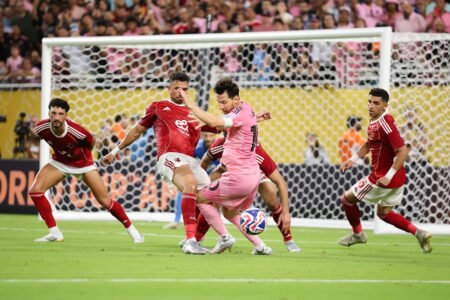MIAMI — When Club World Cup tickets went on sale this winter, Rafael couldn’t resist. A soccer fanatic originally from Mexico who now lives in Southern California, he and his wife planned a trip to the Rose Bowl for PSG vs. Atlético Madrid. But on Thursday, amid reports that U.S. Immigration and Customs Enforcement and Customs and Border Protection would be at Club World Cup games, they scrapped their plan and sold the tickets.
“I really, really didn’t want to let it go,” Rafael said. But he did, “out of fear of apprehension or persecution.”
Advertisement
Rafael — who, fearing consequences, spoke on the condition that Yahoo Sports only publish his given first name — is far from the only fan who’s been deterred by the Trump administration’s crackdown on immigrants. U.S.-based supporters of the Brazilian club Flamengo, for example, canceled watch parties and chose not to travel for Club World Cup matches long before this week.
But fears intensified over the past several days after ICE agents raided Los Angeles workplaces, sparking protests. Around the same time, CBP — which is generally responsible for law enforcement at the U.S. border — posted on social media that it “will be suited and booted ready to provide security for the first round of [Club World Cup] games.” ICE — which is primarily responsible for identifying and arresting violators of U.S. immigration law — soon confirmed that it, too, would be part of the security operation, and reminded non-citizens, via NBC News, to carry proof of legal status.
The news spooked fans who planned to attend Saturday’s opener between Inter Miami and Egypt’s Al Ahly, and who’ve followed reports of ICE detaining immigrants, both those who are in the U.S. illegally and legally.
“It creates an environment where people are less likely to come watch the games because of just sheer intimidation,” Thomas Kennedy of the Florida Immigrant Coalition said.
Advertisement
In recent days — reportedly after FIFA, the Club World Cup’s organizer, expressed concerns about the public reaction to CBP’s post — the post was deleted; and both agencies attempted to clarify that their presence at major sporting events is not uncommon. Their roles, though, are typically peripheral and rarely publicized. And, under Trump, their legitimacy is being questioned.
“How can we trust it’s really for security?” Rafael asked. “It just really feels like they’re setting up a trap.”
On Saturday, Hard Rock Stadium in Miami Gardens, Florida, hosts the opener of the 2025 Club World Cup between Inter Miami and Egypt’s Al Ahly. (REUTERS/Hannah Mckay)
(REUTERS / Reuters)
Neither ICE nor CBP has said what, exactly, its role will be at either the Club World Cup or the Gold Cup, a regional tournament featuring national soccer teams from throughout North and Central America. The Gold Cup also opens Saturday, with Mexico vs. the Dominican Republic at SoFi Stadium near Los Angeles. A person with knowledge of SoFi’s plans told Yahoo Sports on Wednesday that stadium officials were “operating the event per our normal procedures and ICE is not part of those protocols.” But spokespeople for Miami’s Hard Rock Stadium and the Rose Bowl — which are set to host Club World Cup games Saturday, Sunday and throughout the next two weeks — have not commented on ICE’s involvement.
Advertisement
Cliff Stott, a policing expert who has worked with U.S. authorities in multiple cities, told Yahoo Sports that the involvement of federal agencies like CBP and ICE at major sporting events isn’t necessarily common. But, he said, given the protests expected to sweep the country this weekend, the local police departments that typically lead security operations around stadiums might “have to call on federal law enforcement agencies to provide support.”
And he added: “There are some very real dangers in doing that, given the emerging perception of the illegitimacy of those federal agencies — particularly, for example, [if] they’re policing some of the [clubs who] attract large crowds of migrant populations from communities that are already seeing themselves as under attack from those law enforcement agencies.”
Rafael, the fan from Southern California, said: “With everything that’s going on, you wouldn’t be fully trusting of a federal agent at this time.”
He also said that, although he’s a green card holder and in the U.S. legally, he worried about “racial bias” and a lack of due process if he were to be confronted by agents.
Advertisement
In Miami, when asked about concerns that ICE agents would be at Saturday’s Club World Cup opener looking for people who are in the U.S. illegally, FIFA president Gianni Infantino said he didn’t “have any concerns about anything, in the sense that we are very attentive on any security question.”
CONCACAF, which runs the Gold Cup, has not addressed the fears, but did release a statement earlier this week saying that it “remains in close and ongoing communication with local authorities, host venues, and the participating national teams regarding the evolving situation in Greater Los Angeles.”
The two tournaments could also be disrupted by the protests, which began late last week in Los Angeles. Trump, despite pleas to the contrary from local politicians, sent thousands of National Guard troops to Los Angeles to quash the dissent. The protests have since spread, throughout the city and nationwide. This weekend, they are expected to mesh with previously planned demonstrations against the Trump administration and its military parade in Washington, D.C., on the president’s birthday.
Advertisement
The unrest and the administration’s crackdowns are clouding FIFA’s launch of the Club World Cup, and its hopes for the 2026 World Cup, both of which have been sold as “inclusive” and “welcoming” events.
That’s what Rafael hoped this summer’s tournament would be when he bought tickets months ago. That’s what last summer’s Copa América was, he noted. “I never thought I’d have to worry,” he said, “about being racially discriminated against at a soccer game.”
Read the full article here














